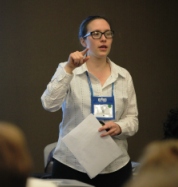- MN ABE Connect
- Archive
- Abby’s Practical Takeaways from COABE
Abby’s Practical Takeaways from COABE
Abby Roza, Instructor Over the past few years, MN ABE has come to be extremely well represented at the national COABE (Commission on Adult Basic Education) conference, with many MN ABE practitioners both attending and presenting. Attendees always come back with a wealth of great ideas to share. In this article, Hennepin County Corrections instructor Abby Roza shares several practical ideas and materials focused on encouraging students to engage in higher-level thinking, as well as integrating multiple strategies and content areas in ABE instruction, such as numeracy, social studies, science, reading, writing, and so on.
Over the past few years, MN ABE has come to be extremely well represented at the national COABE (Commission on Adult Basic Education) conference, with many MN ABE practitioners both attending and presenting. Attendees always come back with a wealth of great ideas to share. In this article, Hennepin County Corrections instructor Abby Roza shares several practical ideas and materials focused on encouraging students to engage in higher-level thinking, as well as integrating multiple strategies and content areas in ABE instruction, such as numeracy, social studies, science, reading, writing, and so on.
One of the things I love about teaching is the variety and breadth of things I want to learn and get better at. Learning from excellent teachers is such a pleasure. There were so many instructional takeaways from COABE, here are a few themes that seemed to repeat across sessions:
1. Shifting Numeracy and Math instruction toward concept development, emphasizing “why?” over “how?”
- Expanding use of hands-on and visual strategies, including various uses of number lines at many levels of math instruction.
- Minnesota’s own Danielle Legault demonstrated using a number line and simple manipulatives to explore Algebraic equations with low-level English language learners. (You can read more about her presentation here.)
- This website from the Annenberg Foundation was recommended. It includes various resources for teachers who want to review math content.
2. Integrating content areas (Math as part of Social Studies, Science and Reading, Non-Fiction reading in all content areas, Writing in all content areas, etc.).
- A workshop in this area suggested a “mash-up” where Language Arts, ELD or literacy instruction could use Social Studies as the content for the texts used for reading and writing instruction. Presenters from Ohio had prepared readings from primary source texts that matched Social Studies areas that teachers had identified as areas where they needed support. I appreciated that this addressed the challenge of fitting more into the limited time we have with our students. Below are posted several of these social studies materials that you can use in your own classroom:
Pedagogy:
Readings:
- GED Testing Service noted that the Reasoning through Language Arts test covers historical documents; they highlighted the first amendment specifically.
- GED Testing Service reminded us that there is enough math on the Social Studies and Science GED tests to warrant a calculator being available for some questions on each.
3. Strategies in all subject areas that push students to reason and analyze, as well as demonstrate and communicate their reasoning.
- A math presenter suggested asking, “What do you mean?” and “Break that term down for me.” She also gave her students a math statement (for example, “2x is bigger than x+x” or “3x+4 = 3a+9-5“) and asked her students if it was true, sometimes true, or never true and why.
- The following math activity used dried beans and tiny “recipes” to have students discuss and create algebraic equations. I created my own worksheet to go with the lesson.
- Teachers of college level Developmental Reading classes and ABE level GED classes explained their use of reader response journals with non-fiction texts. Focused on fluency in analytical writing, these are a cousin to the dialogue journals many of us use in ESL classrooms. Here are their materials complete with prompts and rubric: Reader response materials
4. Thinking out of the box with technology.
- One teacher uses a closed Facebook group as away to extend class. Students preview videos and other materials as an “into” to the lesson and complete writing assignments between classes.
- Another teacher presented on how she “flipped” her math classroom, providing instruction through technology and guiding practice in her face to face time with students. Some of the “flipped classroom” strategies seem to have great potential for maximizing in-class time in a lab setting.
Newsletter Signup
Get MN ABE Connect—the official source for ABE events, activities, and resources!
Sign UpArticle Categories
- ABE Foundations/Staff Onboarding
- ACES/Transitions
- Adult Career Pathways
- Assessment
- CCR Standards
- Citizenship
- COVID-19
- Cultural Competency
- Digital Literacy/Northstar
- Disabilities
- Distance Learning/Education
- ELA
- Equity/Inclusion
- ESL
- HSE/Adult Diploma
- Listening
- Math/Numeracy
- Mental Health
- Minnesota ABE
- One-Room Schoolhouse/Multilevel
- Professional Development
- Program Management
- Reading
- Remote Instruction
- Science
- Social Studies
- Speaking/Conversation
- Support Services
- Teaching Strategies
- Technology
- Uncategorized
- Volunteers/Tutors
- Writing